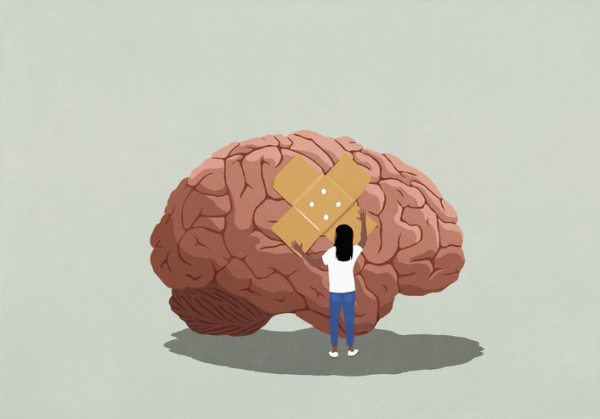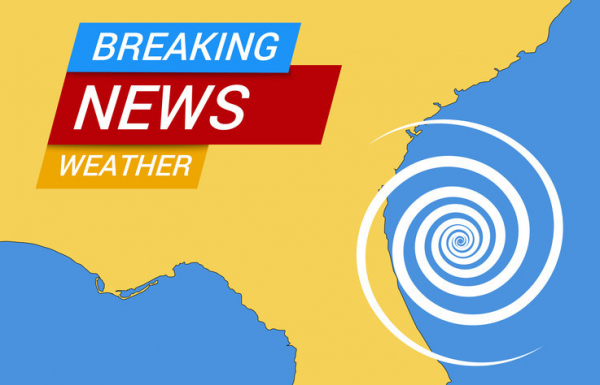
Concussion in children: What to know and do

Concussion is one of the most common injuries to the brain, affecting about two million children and teens every year. It is a particular kind of injury that happens when a blow to the head or somewhere else on the body makes the brain move back and forth within the skull.
It’s possible to get a concussion after what might seem like a minor injury, like a forceful push from behind, or a collision between two players in a football or soccer game.
What are the signs and symptoms of concussion?
Because the injury may not seem that significant from the outside, it’s important to know the symptoms of a concussion. There are many different possible symptoms, including
- passing out (this could be a sign of a more serious brain injury)
- headache
- dizziness
- changes in vision
- feeling bothered by light or noise
- confusion or feeling disoriented
- memory problems (such as difficulty remembering details of the injury) or difficulty concentrating
- balance or coordination problems
- mood changes.
Some of these are visible to others and some are felt by the person with the concussion. That’s why it’s important to know the signs and to ask all the right questions of a child who has had an injury.
Sometimes the symptoms might not be apparent right away, but show up in the days following the injury. The CDC’s Heads Up website has lots of great information about how to recognize a concussion.
How can further harm to the brain be avoided?
The main reason it’s important to recognize a possible concussion early is that the worst thing you can do after getting a concussion is get another one. The brain is vulnerable after a concussion; if it is injured again, the symptoms can be longer lasting — or even permanent, as in cases of chronic traumatic encephalopathy (CTE), a condition that has been seen in football players and others who have repeated head injuries.
If there is a chance that a child has had a concussion during a sports competition, they must stop playing — and get medical attention. It’s important to get medical attention any time there is concern about a possible concussion, both to be sure there isn’t a more serious brain injury, and to do a good assessment of the symptoms, so that they can be monitored over time. There are some screening questionnaires that are used by doctors that can be used again in the days and weeks after the concussion to see how the child is improving.
What helps children recover after a concussion?
Experts have struggled with figuring out how to protect the brain after a concussion. For a long time, the recommendation was to rest and do very little at all. This meant not doing any exercise, not going to school, not even reading or watching television. As symptoms improved, the restrictions were lifted gradually.
Over time, though, research showed that not only was this much rest not necessary, it was counterproductive. It turns out that getting kids back into their daily lives, and back into being active, is safe and leads to quicker recovery. Experts still recommend rest and then moving gradually back into activities, but the guidelines are no longer as strict as they once were.
One important note: A medical professional should guide decisions to move from rest to light activity, and then gradually from there to moderate and then regular activities based on how the child is doing. This step-by-step process may extend for days, weeks, or longer, depending on what the child needs. Parents, coaches, and schools can help support a child or teen as they return to school and return to activities and sports.
Some children will be able to get back into regular activities quickly. But for others it can take weeks or even months. Schools and sports trainers should work with children to support them in their recovery. Some children develop post-concussive syndromes with headache, fatigue, and other symptoms. This is rare but can be very disabling.
How can parents help prevent concussions?
It's not always possible to prevent concussions, but there are things that parents can do:
- Be sure that children use seat belts and other appropriate restraints in the car.
- Have clear safety rules and supervise children when they are playing, especially if they are riding bikes or climbing in trees or on play structures.
- Since at least half of concussions happen during sports, it’s important that teams and coaches follow safety rules. Coaches should teach techniques and skills to avoid dangerous collisions and other injuries. Talk to your child’s coaches about what they are doing to keep players safe. While helmets can prevent many head injuries, they don’t prevent concussions.
About the Author

Claire McCarthy, MD, Senior Faculty Editor, Harvard Health Publishing
Claire McCarthy, MD, is a primary care pediatrician at Boston Children’s Hospital, and an assistant professor of pediatrics at Harvard Medical School. In addition to being a senior faculty editor for Harvard Health Publishing, Dr. McCarthy … See Full Bio View all posts by Claire McCarthy, MD

Packing your hurricane go bag? Make provisions for your health

When you live in a coastal area, preparing early for potential hurricanes is a must. Storms can develop quickly, leaving little time to figure out where you’ll be safe or which items to pack if you have to evacuate. And health care necessities, such as medications or medical equipment, are often overlooked in the scramble.
“People might bring their diabetes medication but forget their blood sugar monitor, or bring their hearing aids but forget extra batteries for them,” says Dr. Scott Goldberg, medical director of emergency preparedness at Brigham and Women’s Hospital and a longtime member of a FEMA task force that responds to hurricane-damaged areas.
Here’s some insight on what to expect this hurricane season, and how to prioritize health care in your hurricane kit.
What will the 2024 hurricane season look like?
This year’s hurricane predictions underscore the urgency to start preparations now.
Forecasters with the National Oceanic and Atmospheric Administration's National Weather Service expect above-normal activity for the 2024 hurricane season (which lasts until November 30).
Meteorologists anticipate 17 to 25 storms with winds of 39 mph or higher, including eight to 13 hurricanes — four to seven of which could be major hurricanes with 111 mph winds or higher.
What kinds of plans should you make?
Preparing for the possibility of big storms is a major undertaking. Long before ferocious winds and torrential rains arrive, you must gather hurricane supplies, figure out how to secure your home, and determine where to go if you need to evacuate (especially if you live in a flood zone). Contact the emergency management department at your city or county for shelter information.
If you’ll need help evacuating due to a medical condition, or if you’ll need medical assistance at a shelter, find out if your county or city has a special needs registry like this one in Florida. Signing up will enable first responders to notify you about storms and transport you to a special shelter that has medical staff, hospital cots, and possibly oxygen tanks.
What should you pack?
While a shelter provides a safe place to ride out a storm, including bathrooms, water, and basic meals, it’s up to you to bring everything else. It’s essential to pack medical equipment and sufficient medications and health supplies.
“It’s natural to just grab the prescription medications in your medicine cabinet, but what if it’s only a two-day supply? It might be a while before you can get a refill. We recommend at least a 14-day or 30-day supply of every prescription,” Dr. Goldberg says. “Talk to your doctor about the possibility of getting an extra refill to keep on standby for your go bag.”
Other health-related items you’ll want to pack include:
- medical supplies you use regularly, such as a blood pressure monitor, heart monitor, CPAP machine, wheelchair, or walker
- over-the-counter medicines you use regularly, such as heartburn medicine or pain relievers
- foods for specific dietary needs, such as gluten-free food if you have celiac disease (if you have infants or children, you’ll need to bring foods they can eat)
- healthy, nonperishable snacks such as nuts, nut butters, trail mix, dried fruit, granola bars, protein bars, and whole-grain bread, crackers, or cereals
- hygiene products such as soap, hand sanitizer, toothbrushes and toothpaste, shampoo, deodorant, infant or adult diapers, lip balm, moist towelettes, and toilet paper — because shelters often run out of it.
Remember the basics
In some ways, you can think of shelter living like camping. You’ll need lots of basic supplies to get through it, including:
- a sleeping bag or blanket and pillow for each person in your family
- clean towels and washcloths
- a few extra changes of clothes per person
- a first-aid kit
- flashlights and extra batteries
- chargers for your electronic gadgets
- rechargeable battery packs.
Bring important paperwork
In addition to supplies, bring important documents such as:
- a list of your medications, vitamins, and supplements (include the name, dose, and frequency of each one)
- a list of the names, addresses, and phone numbers of your primary care provider and any specialists who treat you
- a list of your emergency contacts and their phone numbers
- your pharmacy’s phone number and address
- copies of your birth certificate and driver’s license
- copies of home, car, or life insurance policies
- copies of your health insurance cards
- a copy of your advance directive — which includes your living will and health care proxy form.
“Store these documents on a flash drive. Also make photocopies of them, which are easiest for doctors to consult in an emergency setting. Place them in a plastic zip-top bag to keep them dry,” Dr. Goldberg advises.
Prepare right now
Start today. Gather as many go-bag supplies as you can, including the bags. A small suitcase, backpack, or duffel bag for each person in your family will work well.
And try not to put off these important preparations. “Hurricanes are major stressors. You might be worried, sleep deprived, fatigued, and emotional,” Dr. Goldberg says. “All of that will make it hard to think clearly. You’ll do yourself and your family a favor by having discussions now and getting started on your hurricane plan.”
About the Author

Heidi Godman, Executive Editor, Harvard Health Letter
Heidi Godman is the executive editor of the Harvard Health Letter. Before coming to the Health Letter, she was an award-winning television news anchor and medical reporter for 25 years. Heidi was named a journalism fellow … See Full Bio View all posts by Heidi Godman
About the Reviewer

Howard E. LeWine, MD, Chief Medical Editor, Harvard Health Publishing; Editorial Advisory Board Member, Harvard Health Publishing
Dr. Howard LeWine is a practicing internist at Brigham and Women’s Hospital in Boston, Chief Medical Editor at Harvard Health Publishing, and editor in chief of Harvard Men’s Health Watch. See Full Bio View all posts by Howard E. LeWine, MD